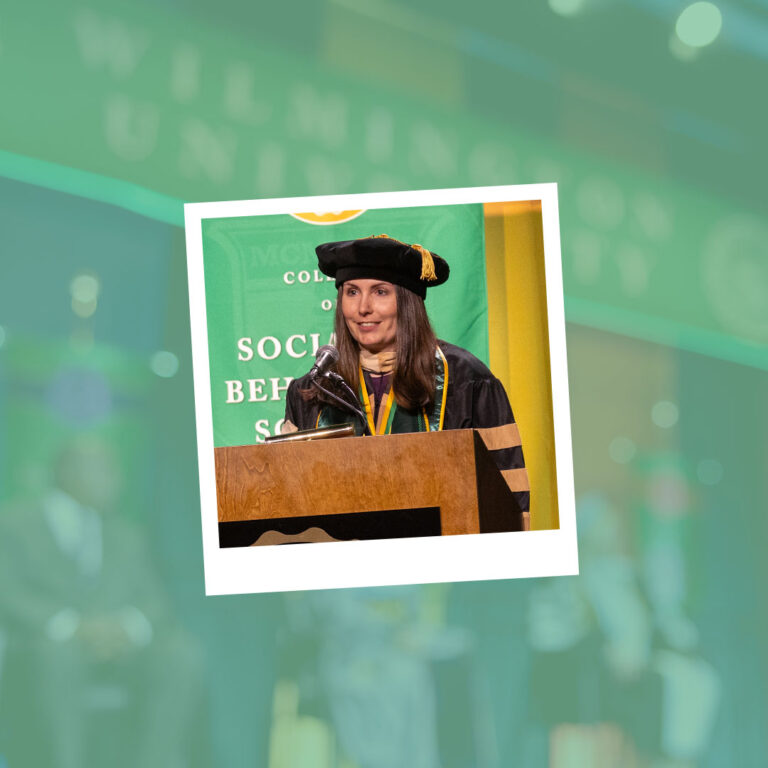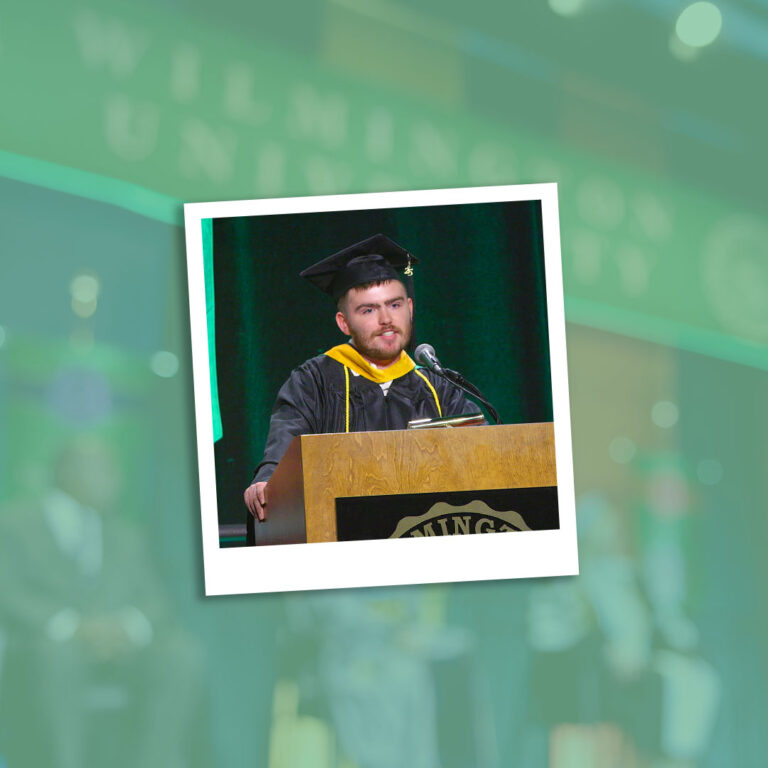The People’s Playwright
WilmU alumnus and adjunct Greg Morris is using his talents to improve life for thousands of Delawareans.
by Bob Yearick

Call them epiphanies, strokes of luck, fortuitous events. Whatever label may apply, Greg Morris’ journey through life has been liberally sprinkled with them. In his early years, they helped divert him from street gangs and drug dealing. Later, they took him on a path to the arts, then fatherhood, academia, and finally, to Wilmington University, where he’s an adjunct in the College of Arts and Sciences. Meanwhile, his career as a playwright and activist is impacting an entire community.
Morris is the author of “#BlackJobsMatter, A Wilmington Experiment,” a 45-minute play first presented in February at the city’s Baby Grand Theater. With Delaware Gov. Jack Markell as guest speaker, the production received tremendous response, prompting an encore in July at a larger venue, the World Café Live at the Queen. Many state and city officials attended both performances.
It was just the latest in a series of plays and short films that have made Morris an important figure, artistically and politically, in The First State, where he took up residence 15 years ago.
“We weren’t rich,” Morris says, “but we didn’t live in poverty. My father worked 30 years in construction as a carpenter and my mother was a housekeeper. I never knew my birth mother.”
An only child, Morris says Leanna was protective of him. Early on he was into sports, but he soon followed some of his friends into gang life in nearby Inglewood. Situated just southwest of L.A., the city of 109,000 has some tough neighborhoods. “That’s where my boys hung out,” says Morris.
That led to fights and dealing marijuana and eventual expulsion from his high school for carrying a weapon — a buck knife — just three months prior to graduation.
“I really disappointed my parents,” he says.
But then another stroke of luck occurred. After transferring to Washington Preparatory High School, Morris met Richard Harris, a music teacher who took the newcomer under his wing.
“He was the first person who told me I was smart enough to go to college,” says Morris. “He asked me what my plan was after high school, and I told him I would probably go into the Army. He said that the service is for people who need to be told what to do, and he asked me if I was one of those people. I said ‘absolutely not.’”
Harris was an adjunct professor at California State University’s L.A. campus, and he took Morris with him to a class he taught. (“I didn’t even know what an adjunct professor was,” says the man who now holds that post at WilmU.)“He opened my mind, opened my horizons,” says Morris. “He was so young then — 22 or 23. He went on to become principal of the school. I went back years and years later and thanked him.”
“He opened my mind, opened my horizons,” says Morris. “He was so young then — 22 or 23. He went on to become principal of the school. I went back years and years later and thanked him.”
Spurred by Harris’ faith in him, Morris, still a gang member and still dealing pot, enrolled in El Camino College, a community school in nearby Torrance. There, his world view expanded even further.
“Until then,” he says, “I only knew blacks, Mexicans and a few Samoans. At El Camino, I met whites, Asians, people from everywhere. And they were all like me, trying to figure out what to do with their life.”

Still seeking that answer, Morris spent two-and-a-half years at El Camino without declaring a major. He went on to another two-year school, West Los Angeles College, still without a major. Admittedly an indifferent student, he was successful in at least one area: selling weed. “Everybody in college did drugs,” he says, shrugging.
His voice betrays just a bit of pride, touched with irony, when he explains his skill at peddling what he calls “high-grade marijuana.”
“I was charismatic, and I was honest. My partner and I were the only ones I knew who could go into (a sketchy neighborhood) to buy our ‘weight,’ and bring it back and sell our whole load.”
He also took a business-like approach to his avocation. “I didn’t do drugs when I was dealing so that I could keep track of the money.”
Morris never lacked ambition. While dealing and going to class, he also held a couple of part-time (legitimate) jobs, thus achieving a kind of ideal trifecta for the street-smart college kid.
Still, he was without career goals. Then came one of those epiphanies. A fellow gang member who was on a college basketball scholarship showed Morris a book he had been assigned to read. “For whatever reason,” says Morris, “I picked it up and starting reading. It was actually a play, ‘The Piano Lesson,’ by August Wilson.”
The fourth play in Wilson’s “The Pittsburgh Cycle,” it won the playwright his second Pulitzer Prize for Drama in 1990. It deals with African-Americans’ approach to their cultural heritage.
Morris immediately identified with the people and the dialogue in the play. “Wilson was writing about something that was going on in the community, going on in the hood,” he says.
He returned the book to his friend, then went to a West L.A. library, discovered other plays by Wilson, and devoured them.
Until then, his knowledge of theater came from church plays touring productions heavy on gospel music and a Christian message. But Wilson’s plays were entirely different. “He was telling stories about people’s lives, like the people that I knew,” says Morris. “That was more like what I wanted to do.”
Morris says he had always had “a hidden gift” for writing, and he began scratching out plays of his own that were performed at his Pentecostal church. He says they received “really great responses.”
His new-found passion led him to an internship with Michael Matthews, a touring gospel playwright from Michigan whom Morris labels “Tyler Perry before Tyler Perry.” Matthews came to L.A. and conducted a workshop on acting, writing and producing plays, and Morris attended. From the workshop, Matthews selected him and another person as interns.
He stayed with the Matthews company while it was in L. A., picking up invaluable experience. Over the next few years, he continued to write while working with other productions in and around the city. And he gave up his pot-selling sideline.

In the meantime, he got married, and in 2001 his wife’s employer transferred her to Philadelphia. That brought them to Wilmington, where they settled because of the more affordable cost of living.
Morris began working as a contractor in various social services areas, counseling special needs kids at William Penn High School, running the Central YMCA’s summer youth program, all while continuing to write plays in the evenings.
Then, as if he wasn’t busy enough, he decided to complete his college education. WilmU’s flexible schedule fit his lifestyle perfectly. With the 21 credits he had managed to accumulate during his California junior college days, he enrolled in the Behavioral Sciences curriculum in 2004.
“Wilmington’s block system was my ally,” he says. “I was able to go all year round and I got my course work done in three years. And I got a tremendous education.”
A college degree finally in hand, Morris seemed to blossom, diving headlong into the academic world. He enrolled at Temple University, studying screen and television writing and earning an MFA in 2012. And in January of the following year, he was hired as an adjunct at WilmU.
He credits Katherine Cottle, assistant professor and Literature and Humanities chair for the College of Arts and Sciences, for her support and guidance. “She helped shape me as a professor,” says Morris.
Cottle calls Morris “a conscientious and empathetic teacher.”
“He teaches basic writing, which gets students ready for college writing. Often, his students feel discouraged from their previous writing experiences, but Greg is really good at getting students enthusiastic about writing. In his class, they want to persist because he teaches them with kindness, firmness, and reminders about who is responsible for their successes: themselves.”
Cottle also praises his work outside the classroom. “He is tireless in telling people’s stories — the stories that often don’t get heard — in his films and plays. And that shows his students how persistence and advocating for one’s vision can pay off in really concrete ways, like being able to make and produce art.
“I’m really glad to have Greg teaching for us because he is an exemplar. Most people have a vision or a dream; Greg works to make his concrete and shows others how to do so in the meantime.”
Morris says he enjoys working with students, and he has found that he can draw on his life on the streets and in the arts to effectively communicate with them.
He has found inspiration not only from his past but also from some of his recent jobs. That includes a stint at Child Development-Community Policing soon after he came to Wilmington. At CDCP, he says, “I would meet the kind of families I would be writing about later. I heard horrible stories: a grandfather who was stabbed to death when he tried to defend his granddaughter against an abusive boyfriend; a mother who was beaten to death by the father in front of their kids.”
The stories resonated with Morris, the father of a 10-year-old son, Jaymen, and 7-year-old twins, Meira and Gabriel. Now divorced, he is very involved in raising them.
His writing during his time at CDCP took on new energy, and he won the Albert Benzwie Fellowship in Playwriting for “The Belly,” a play about life in the inner city. Produced by Temple University, it ran for 14 shows to sellout crowds.
He also wrote, directed and produced his MFA thesis, “Second Chances…An American Tale,” which premiered at The Wilmington Drama League in September 2012. Similar in tone to “The Belly,” it’s infused with the raw language of the streets and represents, according to Morris, “a microcosm of major cities throughout the United States.”
Last year, a seminal moment in his career occurred when he met Bob Elder, a local businessman and member of the Caesar Rodney Rotary Club. Morris screened his short film, “20 Minutes — an American Tale,” for the club at its breakfast meeting. The film follows the lead character, Evan, who is released from jail and calls his older brother for help. The brother tells him he has 20 minutes to get home or not to come home at all. On the way, Evan must run a gauntlet littered with temptations from his past: drugs, money, a married woman, gambling.
Soon after the meeting, Elder, who is director of marketing for the Santora CPA Group, wrote an op-ed for The News Journal titled “Jobs for Wilmington’s Black Men Really Matter.” The piece caused a stir in the city, and Elder decided to reach out to Alan Levin, who had recently stepped down as director of the Delaware Economic Development Office, to discuss possible solutions to black unemployment. He also told Levin about Morris and his work in films and plays. “I want to meet this man,” Levin said.
A breakfast meeting in the Green Room of the Hotel du Pont ensued, and there the three men decided that Morris would use his talent to expand on the op-ed and dramatize the need for black jobs. Levin and other leaders in the community agreed to back the production.
The result was “#BlackJobsMatter: A Wilmington Experiment,” which has become perhaps Morris’ most well-known work. The one-act play, comprising three stories about the issues of unemployment, job discrimination and felon re-entry, was presented free of charge to packed houses at both the January and July performances at the Queen Theatre in Wilmington.
Morris puts the unemployment figure for African-American males in Wilmington at 9,000, a number that came from Elder’s op-ed. The Delaware Department of Labor, however, reports that number at less than 3,000 (This doesn’t include many who are classified as “not in the labor force,” a catch-all category that largely comprises the young, elderly, homemakers and military, as well as others who are either unwilling or unable to be employed.)
Elder and Morris say that although their number may be high, they are referring to jobs that provide a living wage
“Whatever the number,” says Morris, “whether it’s 9,000, 4,000 or 2,000, it’s too many, and unemployment is what leads to crime” — Wilmington’s most pressing problem.
The play suggests one possible solution: enterprise zones, where government tax incentives to businesses provide jobs for underserved residents. Proponents believe this would increase employment, reduce crime and lead to more stable black households. “It’s not the solution,” says Morris, “but it’s a solution.”
WilmU Magazine’s Digital Editorial Assistant Britney Gulledge attended the July 13 show and found it powerful. “Not only did Greg outline the need for jobs,” she says, “but he gave simple solutions that seemed to resonate with the audience, which was comprised of supporters and city officials. And although the focus was on jobs in the African-American community, the audience was diverse, and that brought a feeling of unity and togetherness in tackling the issue of employment in the city.”

A resident of Wilmington’s West Side, Morris says his “art and advocacy” thrust him into a new arena — politics — during the heated race for mayor of Wilmington. “In my play, I’m talking about issues that anyone we elect needs to address,” he says.
Morris says he has been criticized on social media and in the newspaper because his play focuses on the black community to the exclusion of other groups, such as military veterans and Hispanics. “My response is that I write about what I know,” he says, “and I used my opportunity to advocate for my community. I invite others to do the same for their communities.”
Morris calls the critics “misguided” when they conflate “Black Jobs Matter” with “Black Lives Matter,” and characterize the play as anti-white. “My play is about employment, not police brutality or inequality,” he says. “People see ‘Black’ and ‘Matter’ and everything in between is irrelevant to them.”
The criticism hasn’t deterred him. Calling himself “an urban ethnographer,” he is expanding his oeuvre. Plans are in the final stages for “Second Chances . . . An American Tale” to tour five cities — Philadelphia, Baltimore, Washington, D.C., Newark, N.J., then back to Wilmington — late this fall. Morris hopes it will be the first of several five-city tours for the production.
While the arc of his career as both an artist and a teacher seems to be reaching its zenith, his most important role, he told both audiences at “#BlackJobsMatter,” is father. “My children are the best part of me, and everything I’m doing is to leave them something they can benefit from,” he says. “When they’re old enough, I want them to know their dad did work that was important, even if it might not have been popular. And I want them to know that I cared about people.” WU



